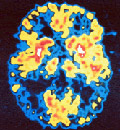
There are some good hope for the patients of Alzheimer's as researchers have made a new breakthrough which may not only help diagnose Alzheimer's, but also assess its severity.
Needless to say, patients with Alzheimer's disease currently undergo neuropsychological testing to detect signs of the disease. The test results are difficult to interpret and are insufficient for making a definitive diagnosis.
According to sources, now scientists have already discovered, activity in certain areas of the cerebral cortex is affected even in the early stages of the disease.
Professor Tiago H. Falk of INRS's Centre Energie Materiaux Telecommunications, specialising in biological signal acquisition, examined this phenomenon and compared the electroencephalograms (EEGs) of healthy individuals (27), individuals with mild Alzheimer's (27), and individuals with moderate cases of the disease (22).He found statistically significant differences across the three groups.
In collaboration with neurologists and Francisco J. Fraga, an INRS visiting professor specializing in biological signals, Professor Falk used an algorithm that dissects brain waves of varying frequencies.
He further said that what makes this algorithm innovative is that it characterizes the changes in temporal dynamics of the patients' brain waves.
Professor Falk asserted that the findings show that healthy individuals have different patterns than those with mild Alzheimer's disease and asserted that they also found a difference between patients with mild levels of the disease and those with moderate Alzheimer's.
(With inputs from ANI)
|
|


Comments: